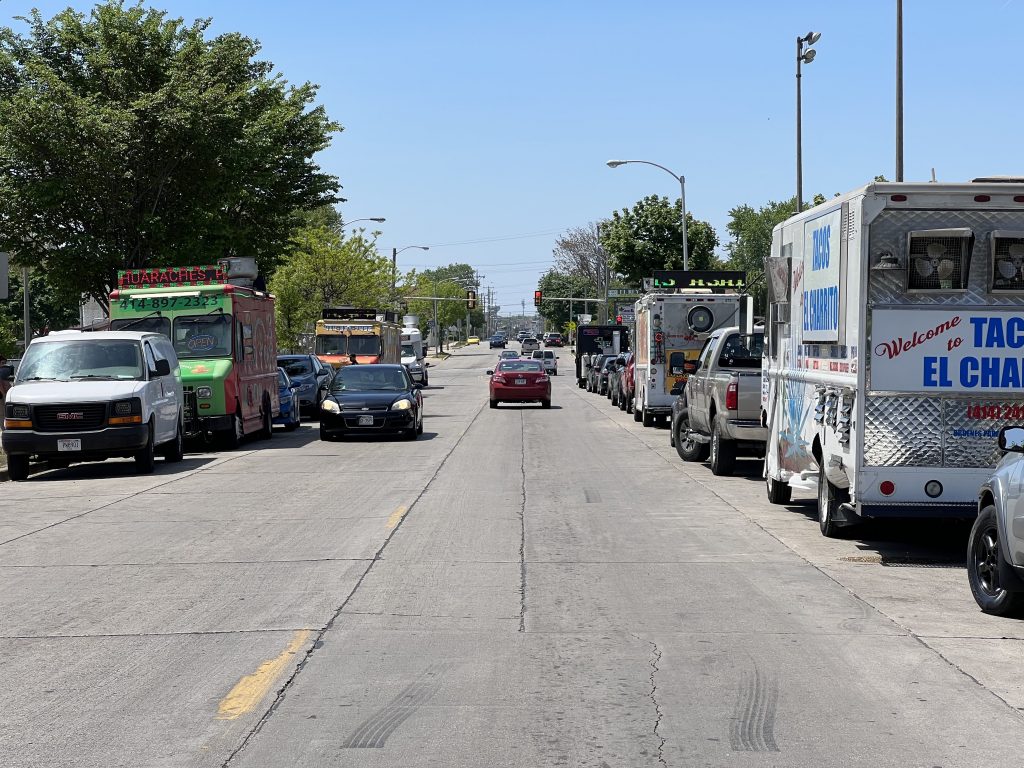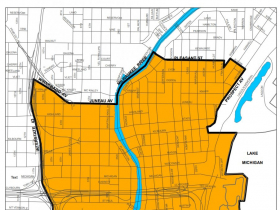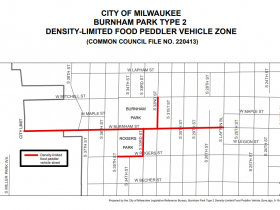New Food Truck Restrictions Approved
Time limits, distance minimums, other rules target bad actors, say sponsors Brostoff and Zamarripa.
The Milwaukee Common Council unanimously approved a new regulatory framework for food trucks Thursday that will substantially change how, where and when food trucks operate.
Lead sponsors JoCasta Zamarripa and Jonathan Brostoff have called the proposal “pro-food truck and pro-community” and one that was a “heavy lift” to craft.
“We have had an influx of food trucks in Milwaukee since the pandemic,” said Zamarripa during a two-hour hearing on the proposal on May 16. She said that the number of operators in the city has doubled since 2014, prompting new issues. Brostoff previously cited concerns on N. Water St. with a growing amount of litter, improperly dumped grease, public urination and customers using others’ parked vehicles as tables.
The policy includes major changes for how and when food trucks operate Downtown, near Burnham Park, on W. Lincoln Ave. and near restaurants.
Downtown is to be subject to a Type 1 zone that would restrict food trucks to operating only until 1 a.m. (instead of 3 a.m. citywide) and not for more than six hours at a time in the zone. W. Burnham St. and a handful of nearby side streets are to be subject to a Type 2 density restriction that limits the number of food trucks and awards operators access to specific spots on a seniority basis. Additional areas could be designated as either zone type.
Citywide, food trucks are to be prohibited from within 50 feet of the front door of a restaurant that doesn’t have a drive-thru.
The ordinance also requires all food truck operators to provide a waste basket and pick up litter, not dump any liquid waste and comply with the city’s nuisance ordinance. Fines for noncompliance would be increased tenfold from a range of $5-$50 to $50-$500, but license fees would not increase. It also closes a loophole that allowed trucks to be licensed by the state or other cities.
Will Mayor Cavalier Johnson sign the proposal? Zamarripa reiterated Wednesday that the policy was crafted after many conversations with several stakeholder groups, including the administration.
“[Johnson] has had positive discussions with council members on this. He will formally review the file when it is delivered to his office,” said a spokesperson for the mayor in a statement Wednesday. Mayoral policy director Claire Zautke said on May 16 that Johnson would sign the policy and actually supported a 1 a.m. citywide closing time.
There were no protesters in the gallery Wednesday. But there is a potential lawsuit looming and others have testified in opposition.
A number of operators, including long-established operators on W. Burnham St., are backing the policy. VISIT Milwaukee, Milwaukee Downtown, Business Improvement District #21, the Brady Street Business Improvement District #11 and the Wisconsin Restaurant Association endorsed the proposal.
Earlier in May, the Wisconsin Institute for Law and Liberty issued a statement opposing the proposal and threatened legal action. It said the framework would create new regulations on small businesses and unfairly restricts hours of operation. “The ordinance also creates the opportunity for special carve outs for the politically connected,” said WILL deputy counsel Lucas Vebber.
Walter Garron leads a coalition of 17 taco truck owners, Taco and Food Trucks Unidos. On May 16, he said the group wasn’t consulted before Brostoff succeeded in implementing a temporary Water Street temporary ban, sparking frustration. He expressed reservations about the latest proposal, including that it would favor politically-connected operators.
Garron, who also leads Brown Berets Wisconsin, said those promoting Downtown are hiding something. “It seems that they do want people here, as long as it’s not people of color and not late at night,” he said. Regarding Burnham Park, he said pedestrian safety concerns are overblown. “The problem is a lot of people are jaywalking,” said Garron.
The Fatty Patty operator Abdullah Ismail testified in opposition to the time component during the proposal’s first hearing. Ismail said his food truck, commonly on Water Street near the bar district, earns as much between 12 a.m. and 2 a.m. as it does in the seven-hour window between 5 p.m. and 12 a.m.
The End of Block-by-Block Bans
Zamarripa and Brostoff’s predecessors were among those that used the council’s decade-long practice of simply banning food trucks from entire blocks to address any issue.
“Implementing a ban never sat well with me,” said Zamarripa during the proposal’s initial hearing. But she said her constituents living near Burnham Park “implored” her to do something about the growing number of food trucks parking on W. Burnham St. just east of S. 35th St.
In addition to the expiration of the Water Street ban, the proposal would eliminate another restriction: a ban on food trucks on W. Lincoln Ave. Zamarripa said she didn’t think the restriction was necessary anymore.
“The long and short of it is we want to move away from the system we had before this legislation, which is when problems arise ban it and push it to somewhere else or do nothing,” said Brostoff on May 16. “Ultimately, we want to grow our entrepreneurial class and make sure it’s open for everyone.”
The two have repeatedly noted the difficulty in crafting the policy.
“No other alder has wanted to touch this and now I understand why,” said Zamarripa on May 18 during the proposal’s second hearing.
On Wednesday she again credited Jesus Gonzalez, the owner of Zocalo Food Park, with giving her good advice on how to hear from operators and the community and for supporting the policy.
Future Changes?
Ald. Scott Spiker sought unsuccessfully to amend the proposal to allow the city’s parking enforcement officers to be able to cite food trucks for operating within 300 feet of a school. The policy already exists, but requires a police officer to enforce.
“Not every job the police do is one you need arrest powers and a gun to accomplish,” said the alderman, the council’s leading advocate for expanding the civilianization of the police department. “My reason for focusing on schools is simple. I’ve had issues in the past.”
“I do feel this borders on mansplaining and I will not be supporting this substitute,” said Zamarripa after Spiker gave a lengthy speech that touched on the history of using civilians to issue parking tickets and different reasons people might be motivated to support the proposal.
“It has been explained to him what a heavy lift this piece of policy has been,” said the alderwoman. She said the annual review requirement would allow Spiker to revisit the idea in the future.
“I don’t know that I can match the long-winded nature of my colleague,” said Brostoff. He praised Spiker for being policy minded, but said the proposal was a result of an internal struggle between Spiker and the Department of Public Works (DPW).
“They said they don’t want to do it,” said Spiker. He said DPW cited capacity and safety concerns. After hearing objections from other colleagues, Spiker withdrew his proposal before it could be voted on.
There was one amendment adopted Wednesday. Zamarripa added two blocks of S. 36th St. to the Burnham Park area restrictions.
The policy cannot go into effect until signed by the mayor and being published. Signage is to be changed by DPW to denote the two zones.
Council members Marina Dimitrijevic and Lamont Westmoreland are also co-sponsors of the proposal.
Type 1 and Type 2 Zone Maps
Legislation Link - Urban Milwaukee members see direct links to legislation mentioned in this article. Join today
If you think stories like this are important, become a member of Urban Milwaukee and help support real, independent journalism. Plus you get some cool added benefits.
More about the Food Truck regulatory framework
- City Hall: Proposal Would Allow Food Trucks To Return To W. Capitol Drive - Jeramey Jannene - Mar 29th, 2024
- Burnham Park Food Truck Zone Unveiled - Sophie Bolich - Aug 9th, 2023
- Food Trucks Banned On Portion of W. Silver Spring Drive - Jeramey Jannene - Jul 31st, 2023
- City Hall: New Food Truck Restrictions Approved - Jeramey Jannene - May 31st, 2023
- City Hall: Food Trucks Face New Restrictions - Jeramey Jannene - May 16th, 2023
- City Hall: New Proposal Would Regulate When, Where And How Food Trucks Operate - Jeramey Jannene - May 11th, 2023
- City Hall: Council Bans Food Trucks Along Four Blocks of Water Street - Jeramey Jannene - Apr 18th, 2023
- City Hall: Food Truck Ban for Downer Ave. Proposed - Jeramey Jannene - Jul 20th, 2020
- Taco Truck Issue Still Not Settled - Edgar Mendez - May 6th, 2019
- City Hall: Food Truck Truce Reached - Jeramey Jannene - Mar 26th, 2019
Read more about Food Truck regulatory framework here
Political Contributions Tracker
Displaying political contributions between people mentioned in this story. Learn more.
- July 25, 2019 - JoCasta Zamarripa received $100 from Claire Zautke
- June 24, 2019 - JoCasta Zamarripa received $100 from Claire Zautke
- October 25, 2015 - Cavalier Johnson received $50 from Claire Zautke
City Hall
-
Council Blocked In Fight To Oversee Top City Officials
 Dec 16th, 2025 by Jeramey Jannene
Dec 16th, 2025 by Jeramey Jannene
-
Latest Effort to Adopt New Milwaukee Flag Going Nowhere
 Dec 3rd, 2025 by Jeramey Jannene
Dec 3rd, 2025 by Jeramey Jannene
-
After Deadly May Fire, Milwaukee Adds New Safety Requirements
 Dec 2nd, 2025 by Jeramey Jannene
Dec 2nd, 2025 by Jeramey Jannene























